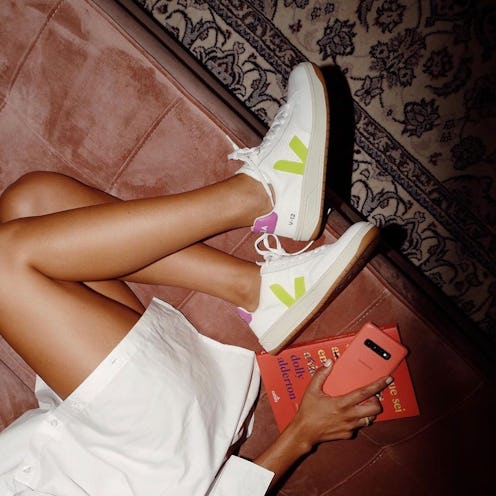(Fashion)
4 Game-Changing Shoe Brands That Make Sustainability Look Good

There are many small ways to be more sustainable — using metal straws, shopping vintage, walking or taking public transport. Shoppers are questioning the quality, longevity, and impact of what they're buying, especially when it comes to fashion — one of the highest polluting industries across the globe. Footwear can be an especially tricky area — not always practical to buy second hand. But a number of sustainable shoe brands are finding eco-friendly solutions that will have impact on the industry as a whole.
“Footwear represents about one fifth of the total environmental impact from the apparel industry, and nearly a quarter of the climate impact, says Kathleen Talbot, the chief sustainability officer and VP of operations at Reformation, whose sustainable footwear collection saves an average of 70 percent more water and 65 percent more waste than an average shoe according to their sustainability reports.
Reformation shoes, which launched this past May, joins the ranks of shoe brands like Cariuma, Veja, and Rafa who are key players in the sector. Innovative production techniques and development of alternate materials are just a few ways these brands are tackling waste. Below, these four brands explain more on why they made eco-friendly shoes a priority and how they are paving the way for more sustainable ground (literally).
Reformation
Already adored for its sustainable mission, the cult-loved label Reformation ventured into footwear as a response to customer feedback. “Shoes are the number one most requested item from our customers so it really made sense as the next step in our mission to bring sustainable fashion to everyone,” says Talbot. “We’re excited that we can now offer our customers more sustainable options from head to toe.”
Reformation's sweet spot is in the fact that it understands trends, making covetable designs like strappy heels, suede boots, and python-embossed flats that happen to be made in a sustainable way. Talbot explains that the label uses deadstock leather, an in-house water treatment plant, and solar energy to heat water. “We’re always making advances and prioritizing sustainable innovation to find new and better ways to offer more sustainable product choices to consumers,” she explains. For Ref Shoes, we worked hard to find partners who understand our mission and we are willing to cooperate to push the industry forward.”
VEJA
The Meghan Markle-approved sneaker brand is known for its streamlined sneakers. After traveling post-college, co-founders Sébastien Kopp and François-Ghislain Morillion visited factories around the world to educate themselves on eco-friendly practices and in turn create a sustainable footwear brand of their own. And when looking for a place to start, Kopp (a sneakerhead himself) looked to sneakers first.
“We love trainers. We’ve worn them since childhood and it’s with our generation that trainers went from the sports field to the street,” says Kopp. “It’s also the product that has the highest advertising costs. By cutting down advertising, we knew we could make a Fairtrade and ecologically-friendly trainer that would cost much more to produce but respect the environment and the people in its production chain”. By forgoing traditional advertising for word of mouth, the brand is able to competitively price their designs while paying for premium materials, fair labor, and R&D. The brand has worked to find new ways to upcycle materials like cotton and plastic, while also testing out materials like fish leather (made of Tilapia hides).
RAFA
Remember the ‘90s-inspired Mary Janes, clogs and strappy sandals that had fashion girls in a frenzy this past year? RAFA is creating those exact shoes, but with sustainability at every touchpoint of its cool footwear. “It’s about appreciating quality over quantity and prioritizing the long-term environmental impact in every decision we make in daily life,” Creative Director Taghrid Chaaban-Zorob explains.
In an effort to reduce waste, each of RAFA’s shoes are made to order. The brand uses animal-free leather and locally-sourced materials to reduce carbon footprint and forgoes shoe boxes to reduce waste. “All of these decisions we made when starting RAFA were really easy because we view our shoes as more than a commodity,” she says. "We design shoes in the way real women think and operate, not according to trends or seasons. We are also showing that you can have a profitable business that highlights the environment."
Cariuma
“Sustainability is at the forefront of everything we do,” explains Fernando Porto, co-founder and COO of Cariuma. “Having been born in Brazil, between the oceans, the rainforest, and the mountains, choosing to protect our environment feels only natural. We start by ensuring fair conditions for our workers and using premium natural and recycled materials that are not only more sustainable, but that will last longer.”
“Our main ethos are to always evolve, learn fast, and improve fast,” Porto explans. “We are now really focused on material development and on evolving the manufacturing process to use less energy, while simultaneously reducing waste in every way we can. Making shoes using bamboo, sugarcane, mamona, and recycled plastics is not easy, but we believe we are part of a few companies that are changing the game, and taking the industry forward.”
This article was originally published on